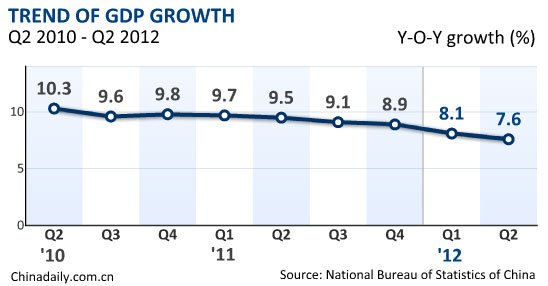China Q2 growth slows to 3-year low of 7.6%
Updated: 2012-07-13 10:14
By Zhang Yuwei in New York and Chen Jia in Beijing (chinadaily.com.cn)
|
||||||||
China's economy reported 7.6 percent of growth in the second quarter, the lowest since the first quarter of 2009 when the global financial crisis was rampant, amid concerns about the slow-down of the second-largest in the world and the strongest one in the major economies.
The National Bureau of Statistics said on Friday that in the first half, the country's economy grew by 7.8 percent to 22.71 trillion yuan ($3.56 trllion). The growth in the first quarter was 8.1 percent.
It is the lowest growth in the past 13 quarters.
 |
China's manufacturing, foreign trade and investment have been slowing down this year, triggering worries about a hard landing of its economy, whose role is more important as the eurozone is still struggling with the debt crisis, the US is still on the way to recover and emerging economies such as India and Brazil are also slowing down.
China's central bank has cut the interest rates twice this year to stabilize the growth. Premier Wen Jiabao also vowed to maintain a stable economy in recent visits in the nation and major conferences.
Leo Abruzzese, global forecasting director at the Economist Intelligence Unit which conducts extensive research on China's economy, thinks the Chinese government's trying to slow down the economy is also a way to cope with the global economy when both Europe and the US are experiencing financial problems.
"If the (Chinese) government were to stimulate the economy hugely the way it did a few years ago, that probably would be the worst thing they could do," said Abruzzese, adding stimulus should be done moderately.
China's growth has been relying on foreign investments and exports, says Abruzzese, adding the Chinese government should drive more domestic consumption.
"China has to get to the point where the consumers in China need to start consuming more. It has to start re-balancing the economy. China is not a wealthy country but it is a middle-class country right now, too," said Abruzzese. "The Chinese government needs to start creating more social safety programs, more social insurance programs, where people then won't feel they need to save quite as much as they do."
Derek Scissors, a senior research fellow at The Heritage Foundation, said China has raised the average of world growth in almost every year of the reform period. It can contribute more to world growth by rebalancing the economy away from investment and toward consumption.
"If China's GDP growth slows but it also rebalances, that is a much greater contribution to the world economy than fast, unbalanced growth," he said.
Scissors expected China to announce GDP growth of 8.2 percent for the full year of 2012.
"However, the days of announcing 10 percent growth or higher are over. For a few years, the range is likely to be 7 to 8.5 percent, then it may get slower. This is natural," he said.
However, Sebastian Mallaby, director of the Center for Geoeconomic Studies, believed China will deliver further fiscal stimulus, both to support its own growth and to contribute to global demand.
"At a time when the eurozone is in trouble, US fiscal stimulus has been pushed as far as it can be, and growth is weak in Japan, India, Brazil and other important economies, the world needs stimulatory policies from major economies that have a strong enough financial position to deliver them safely. China should lead in this respect," he said.
Abruzzese said "a little less saving and a little more spending" would be better for China's and the world's economy.
"China's economy is strong but it's a little bit distorted. When China starts to buy more, everybody else will be a little happier, too," he said.
Abruzzese believed the Chinese government's recent moves of cutting the interest rates shows the country is being more integrated and move involved in the global economy.
"China realizes that it is no longer a minor player (in global economy). If everybody else is taking steps to try to shore up the global economy, so is China by cutting interest rates."
Central banks in different countries have been cutting interest rates recently. China, in particular, has cut interest rates twice in June and July. The moves were seen as unexpected because the People's Bank of China had not cut interest rates since 2008. China's benchmark lending rates were lowered to 6 percent, and deposit rates were down to 3 percent after the second cut.
Both the European Central Bank and Brazil's central bank have also cut their interest rates last week and this week to kick start the slow economy.
Chen Weihua and Ariel Tung contributed to the story from New York.
Contact the writers at yuweizhang@chinadailyusa.com and chenjia1@chinadaily.com.cn

 Relief reaches isolated village
Relief reaches isolated village
 Rainfall poses new threats to quake-hit region
Rainfall poses new threats to quake-hit region
 Funerals begin for Boston bombing victims
Funerals begin for Boston bombing victims
 Quake takeaway from China's Air Force
Quake takeaway from China's Air Force
 Obama celebrates young inventors at science fair
Obama celebrates young inventors at science fair
 Earth Day marked around the world
Earth Day marked around the world
 Volunteer team helping students find sense of normalcy
Volunteer team helping students find sense of normalcy
 Ethnic groups quick to join rescue efforts
Ethnic groups quick to join rescue efforts
Most Viewed
Editor's Picks

|

|

|

|

|

|
Today's Top News
Health new priority for quake zone
Xi meets US top military officer
Japan's boats driven out of Diaoyu
China mulls online shopping legislation
Bird flu death toll rises to 22
Putin appoints new ambassador to China
Japanese ships blocked from Diaoyu Islands
Inspired by Guan, more Chinese pick up golf
US Weekly

|

|






